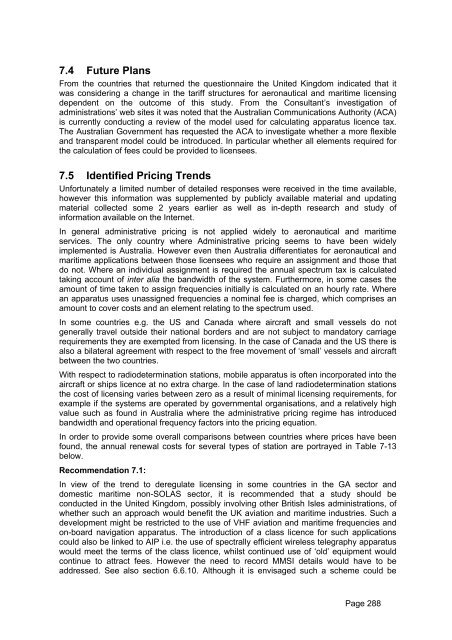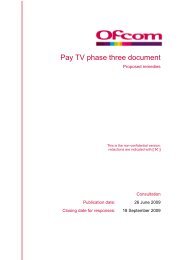FINAL REPORT - Stakeholders - Ofcom
FINAL REPORT - Stakeholders - Ofcom
FINAL REPORT - Stakeholders - Ofcom
Create successful ePaper yourself
Turn your PDF publications into a flip-book with our unique Google optimized e-Paper software.
7.4 Future Plans<br />
From the countries that returned the questionnaire the United Kingdom indicated that it<br />
was considering a change in the tariff structures for aeronautical and maritime licensing<br />
dependent on the outcome of this study. From the Consultant’s investigation of<br />
administrations’ web sites it was noted that the Australian Communications Authority (ACA)<br />
is currently conducting a review of the model used for calculating apparatus licence tax.<br />
The Australian Government has requested the ACA to investigate whether a more flexible<br />
and transparent model could be introduced. In particular whether all elements required for<br />
the calculation of fees could be provided to licensees.<br />
7.5 Identified Pricing Trends<br />
Unfortunately a limited number of detailed responses were received in the time available,<br />
however this information was supplemented by publicly available material and updating<br />
material collected some 2 years earlier as well as in-depth research and study of<br />
information available on the Internet.<br />
In general administrative pricing is not applied widely to aeronautical and maritime<br />
services. The only country where Administrative pricing seems to have been widely<br />
implemented is Australia. However even then Australia differentiates for aeronautical and<br />
maritime applications between those licensees who require an assignment and those that<br />
do not. Where an individual assignment is required the annual spectrum tax is calculated<br />
taking account of inter alia the bandwidth of the system. Furthermore, in some cases the<br />
amount of time taken to assign frequencies initially is calculated on an hourly rate. Where<br />
an apparatus uses unassigned frequencies a nominal fee is charged, which comprises an<br />
amount to cover costs and an element relating to the spectrum used.<br />
In some countries e.g. the US and Canada where aircraft and small vessels do not<br />
generally travel outside their national borders and are not subject to mandatory carriage<br />
requirements they are exempted from licensing. In the case of Canada and the US there is<br />
also a bilateral agreement with respect to the free movement of ‘small’ vessels and aircraft<br />
between the two countries.<br />
With respect to radiodetermination stations, mobile apparatus is often incorporated into the<br />
aircraft or ships licence at no extra charge. In the case of land radiodetermination stations<br />
the cost of licensing varies between zero as a result of minimal licensing requirements, for<br />
example if the systems are operated by governmental organisations, and a relatively high<br />
value such as found in Australia where the administrative pricing regime has introduced<br />
bandwidth and operational frequency factors into the pricing equation.<br />
In order to provide some overall comparisons between countries where prices have been<br />
found, the annual renewal costs for several types of station are portrayed in Table 7-13<br />
below.<br />
Recommendation 7.1:<br />
In view of the trend to deregulate licensing in some countries in the GA sector and<br />
domestic maritime non-SOLAS sector, it is recommended that a study should be<br />
conducted in the United Kingdom, possibly involving other British Isles administrations, of<br />
whether such an approach would benefit the UK aviation and maritime industries. Such a<br />
development might be restricted to the use of VHF aviation and maritime frequencies and<br />
on-board navigation apparatus. The introduction of a class licence for such applications<br />
could also be linked to AIP i.e. the use of spectrally efficient wireless telegraphy apparatus<br />
would meet the terms of the class licence, whilst continued use of ‘old’ equipment would<br />
continue to attract fees. However the need to record MMSI details would have to be<br />
addressed. See also section 6.6.10. Although it is envisaged such a scheme could be<br />
Page 288
















